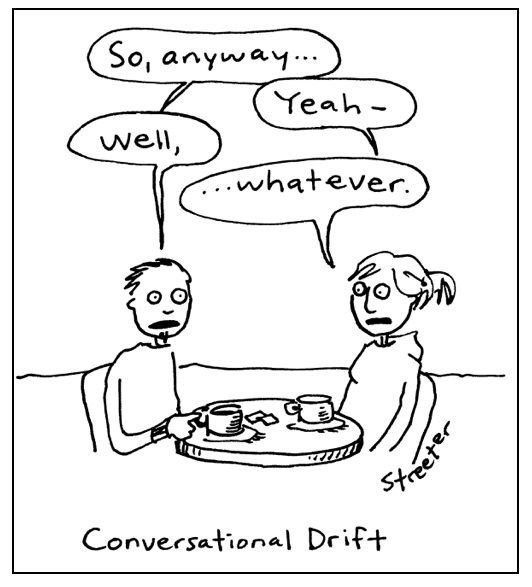 Everything becomes a little different as soon as it is spoken out loud. —Hermann Hesse
Everything becomes a little different as soon as it is spoken out loud. —Hermann Hesse
Do you ever track conversations?
I do.
Sometimes I wish I didn’t, because I find most conversations are unbalanced, trivial, and forgettable.
Try it yourself. The next time you’re part of a group conversation, mentally keep track of who speaks, for how long, and the topics that are discussed.
In previous posts I have discussed the importance of listening and having a balanced conversation.
- Guidelines for a thoughtful, respectful conversation
- Value times of silence in conversations
- Seek first to understand, then to be understood
In this post let’s consider what we talk about. Consider these five categories, listed from shallow to significant.
1. Pleasantries—weather, sports, etc.
We usually start conversations with inconsequential remarks, and that’s okay; it’s a courteous and subtle way to start. But let’s not stay there long. Polite conversation should be a prelude to more important topics.
2. Physical and emotional issues
How are you feeling, physically? It’s not necessary to discuss details about your recent trip to the doctor’s office and don’t elaborate on your medications; just summarize. Also, share how you’re feeling emotionally, but don’t belabor the issue, particularly if not much has changed since the last time we talked.
3. Projects
What’s going on in your life right now? What projects are you working on? What are your plans for the near future? People who are fully engaged in life are always working on projects; they are excited about getting something accomplished.
4. Current events
What do you think about the latest events in North Korea? Isn’t it fascinating that the New Horizons satellite recently flew by Pluto? Observing current events, and developing an opinion about them, makes for interesting conversation. But don’t just regurgitate facts about events; have an informed opinion about them.
Incidentally, all current events are not equal in significance. Discussing an article from US Magazine, watching Hollywood Now, or keeping up with Kim Kardashian is not the same as discussing political ideologies or advances in science.
5. Significant thoughts
This is the sweet spot; this is where we need to land and linger. Let’s discuss interesting and challenging ideas that address important issues. Let’s consider them conceptually and then apply them personally.
For instance, these questions might prompt interesting conversation:
- What’s the most interesting book you’ve read lately, and what did you learn from it?
- What do you think about this statement made by Thomas Jefferson: “Pursue truth no matter where it may lead you”?
- Do you agree with this statement by Federico Fellini: “I want to live so that my life cannot be ruined by a single phone call.”?
- What does it mean to be diligent?
- Why was the 1913 premier of Stravinsky’s Rite of Spring so controversial? What are some current controversial issues that may someday be benign?
Most conversations never get to this deep level unless someone intentionally directs them there. It takes courage and a bit of presumption to orchestrate a conversation, but without direction most conversations drift into pablum and stay there. I double-dog dare you: next time you’re part of a lengthy conversation (15-30 minutes), introduce a significant topic and see what happens.
Interestingly, meaningful conversations are not restricted to, or guaranteed by, long-term relationships. I’ve had deeper conversations with strangers on an airplane than with some people I’ve known for decades.
I long for friends and colleagues that value deep conversations.
Summary
What? – Often, our conversations center on trivial topics. We should spend more time talking about significant issues.
So what? – Be more aware of your conversations, and when possible, steer the conversation toward meaningful topics.
Now what? – Upgrade your conversations to include the discussion of ideas.

 Being heard is so close to being loved that for the average person, they are almost indistinguishable. –David Augsburger
Being heard is so close to being loved that for the average person, they are almost indistinguishable. –David Augsburger I’m a huge fan of setting goals. If you aim at nothing you will always hit it.
I’m a huge fan of setting goals. If you aim at nothing you will always hit it.